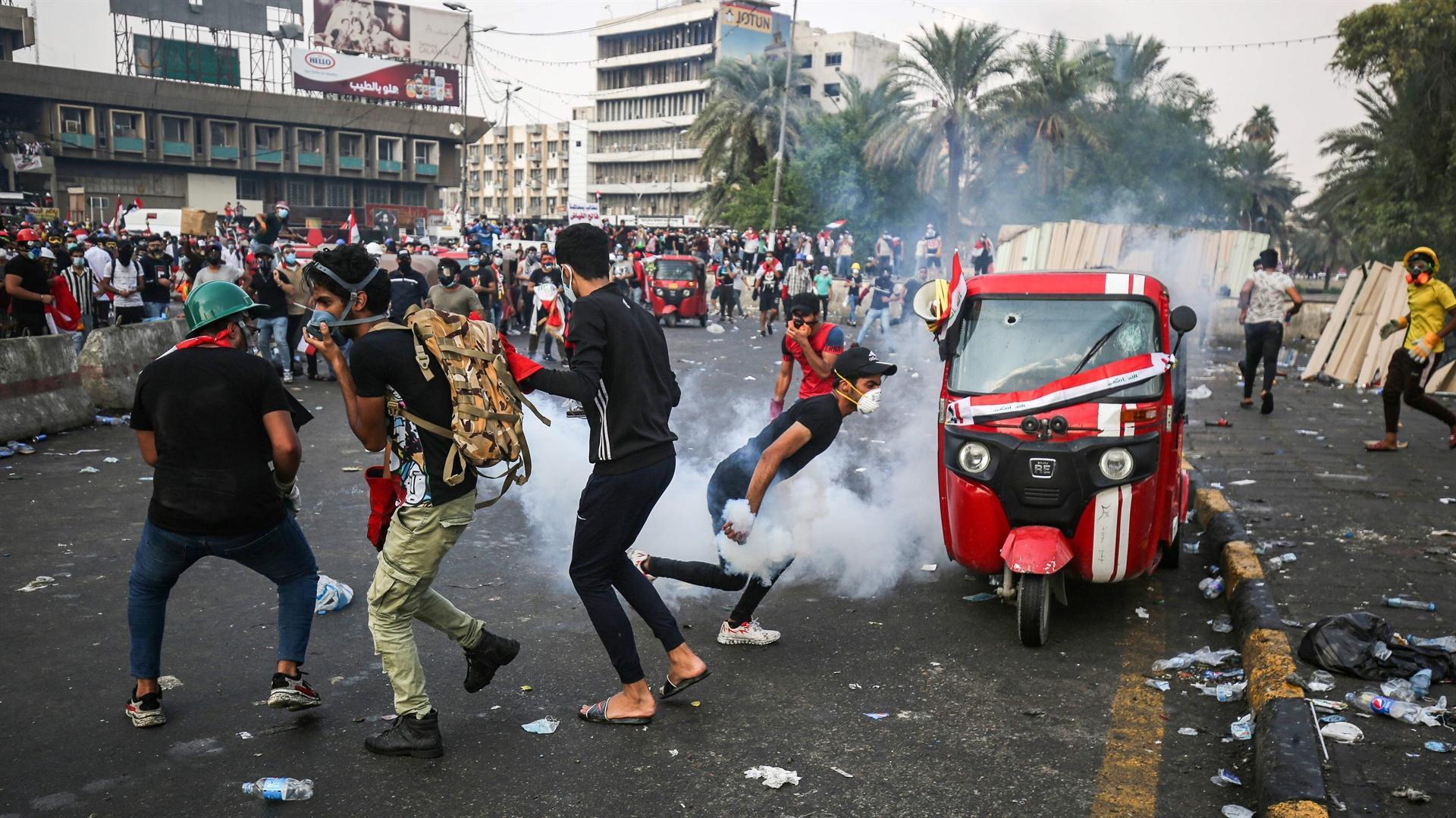
Iraqi protesters attacked houses of government officials and lawmakers in the southern province of Dhi Qar, according to a local police officer, Turkey's state-run Anadolu Agency reported on Oct. 30.
Demonstrators set ablaze the houses of two Shia lawmakers in the province, the officer said on condition of anonymity because he was not authorized to speak to the media.
Angry protesters also attempted to storm the house of Cabinet Secretary-General Hamid al-Ghazi in the town of Shatrah, the officer said.
"Eight people were injured when security forces opened fire to force the protesters away," he said.
In the meantime, Iraqi Prime Minister Adel Abdul Mahdi's two main backers have agreed to work to remove him from office as protests against his government gained momentum in Baghdad and much of the Shi'ite south only to be met with violence, Reuters reported on Oct. 30.
Populist Shi'ite cleric Moqtada al-Sadr, who leads parliament's largest bloc, had asked Abdul Mahdi to call an early election. When the premier refused, he called on his main political rival Hadi al-Amiri to help oust him.
Amiri - who leads a parliamentary alliance of Iran-backed Shi'ite militia that holds the second-largest amount of seats in parliament behind Sadr's alliance - issued a statement late on Tuesday agreeing to help oust the prime minister.
"We will work together to secure the interests of the Iraqi people and save the nation in accordance with the public good," Amiri said in a statement.
Abdul Mahdi took office just a year ago after weeks of political deadlock in which Sadr and Amiri both failed to secure enough votes to form a government. They appointed Abdul Mahdi as a compromise candidate to lead a fragile coalition government.
On Oct. 29, masked gunmen opened fire at Iraqi protesters in the Shiite holy city of Karbala, killing 18 people and wounding hundreds, security officials said, in one of the deadliest single attacks since anti-government demonstrations erupted earlier this month.
The overnight attack came as Iraqis took to the streets for a fifth straight day after a hiatus in the demonstrations that began earlier this month to protest government corruption, a lack of jobs and municipal services, and other grievances. The earlier protests also saw violence against protesters, and a total of 240 people have been killed since the unrest began.
But the bloodshed in Karbala could mark a turning point because of the high death toll and because the city is a major pilgrimage site where a revered Shiite figure was killed in a 7th century battle.
Similar anti-government protests are underway in Lebanon, where supporters of the Iran-backed militant group Hezbollah stormed the main protest camp and Prime Minister Saad Hariri said he would resign after hitting a "dead end" in trying to resolve the crisis. The protests in both countries are directed at governments and armed political factions that are close to Iran, raising fears of a violent backlash.
There were differing accounts and death tolls from Karbala, and details were still emerging from the scene.
Amid a clampdown by security forces, it was difficult to piece together what exactly prompted the attack. Eyewitnesses told The Associated Press that masked gunmen opened fire on the camp.
Protesters said they did not know if the masked men were riot police, special forces or Iran-linked militias.
The protesters said Iraqi soldiers had been stationed around the protest site but withdrew after the attackers began firing tear gas and live ammunition.
Provincial Gov. Nassif al-Khutabi denied that any protesters were killed but said there were some injuries among security forces.
He said videos posted online were fabricated and not from Karbala.
The day after anti-government protests erupted in Iraq, Iranian Gen. Qassim Soleimani flew into Baghdad late at night and took a helicopter to the heavily fortified Green Zone, where he surprised a group of top security officials by chairing a meeting in place of the prime minister.
The arrival of Soleimani, the head of Iran's elite Quds Force and the architect of its regional security apparatus, signaled Tehran's concern over the protests, which had erupted across the capital and in Iraq's Shiite heartland, and included calls for Iran to stop meddling in the country.
"We in Iran know how to deal with protests," Soleimani told the Iraqi officials, according to two senior officials familiar with the meeting who spoke on condition of anonymity to discuss the secret gathering. "This happened in Iran and we got it under control."
The leaderless and largely spontaneous protests across Iraq have been met with bullets and tear gas by security forces from the start.
At least 73 people - not including the latest fatalities in Karbala - have been killed since anti-government demonstrations resumed on Oct. 25, while 149 were killed during the earlier wave of protests this month.
The demonstrations are fueled by anger at corruption, economic stagnation and poor public services. Despite its vast oil wealth, Iraq suffers from high unemployment and crumbling infrastructure, with frequent power outages that force many to rely on private generators.
The protests have grown and demonstrators are now calling for sweeping changes, not just the government's resignation. Prime Minister Adel Abdul-Mahdi has promised a government reshuffle and reforms, which the demonstrators have already rejected.
Authorities on Oct. 28 imposed a midnight-to-6 a.m. curfew in Baghdad, as renewed protests raged there and across the south.
Students skipped classes at several universities and secondary schools in Baghdad and across southern Iraq to join the protests on Oct. 28, despite the government ordering the institutions to operate as normal. A senior security official estimated that 25,000 people protested in the capital that day.
Three people were killed, including a 22-year-old female medical student, the first woman to die since the protests began earlier this month. Seventeen students were among the wounded.